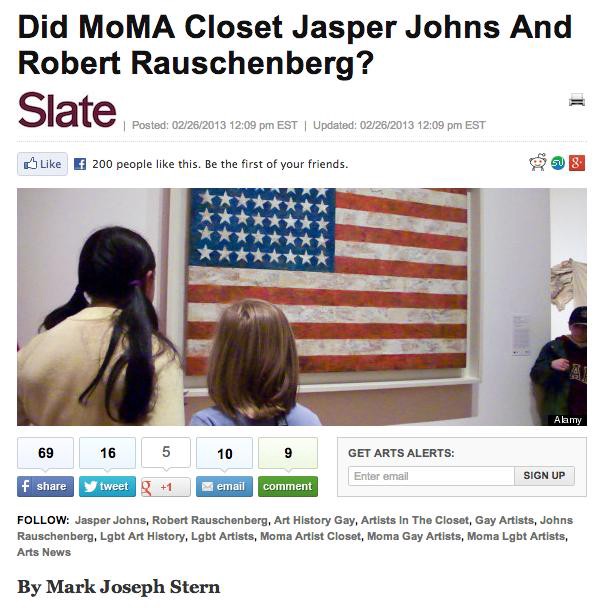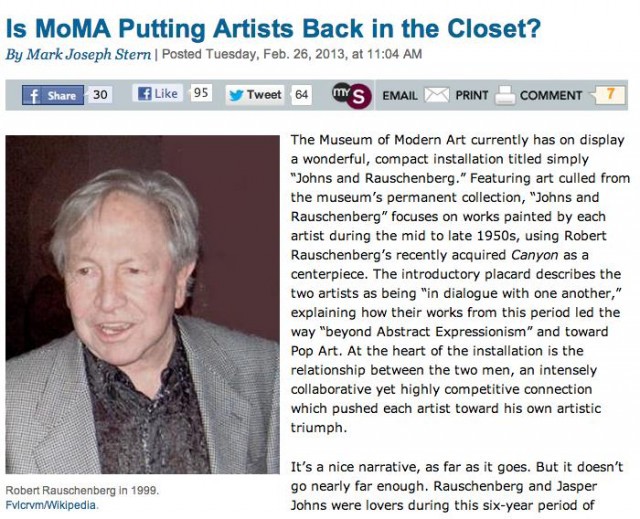New York City, February 26, 2013

★ Steadily bleakening grayness. Though the light looked featureless, the clouds were curdling. The wind was lazily pushy — there wasn’t much of it, yet it was cold, and it managed to be in one’s face even after rounding a corner. Tourists clutched guidebooks or maps with both hands, bracing themselves. The umbrella returned home as dry as it had left.
White Conservatives On Supreme Court Wondering Whether We Need Laws That Allow Black People To Vote...
White Conservatives On Supreme Court Wondering Whether We Need Laws That Allow Black People To Vote For Democrats

It’s tough to keep black people in the South from voting when there are intrusive federal laws trying to let black people vote. Have we learned nothing from the blockbuster motion picture Lincoln? Yes, we have learned nothing, and also the Democrats appear to be on some kind of permanent demographic winning streak, say the old white conservatives on the Supreme Court. So it’s probably time to put aside these outdated old laws. Why, racism ended a long, long time ago. Especially in the Deep South.
In today’s loaded questioning, the four white conservative justices expressed sincere skepticism about the federal law protecting the rights of black voters in the South, and made it pretty clear that they intend to support a racist Alabama county’s case for killing a central provision of the 1965 Voting Rights Act.
Clarence Thomas was utterly silent during today’s questioning, as he is only allowed to speak once every seven years and the last time was only a month ago, an occasion he used to mumble an incompetent joke that was supposed to insult graduates of Yale, his alma mater. (The other justices talked over him, so there’s not even a clear transcript of what he was attempting there, humor-wise.)
Clarence Thomas, what a singular individual! It must be a strange feeling to be the only black American (mutely) in favor of ending the Voting Rights Act, and to be sitting up there with your four white bosses who do the talking and tell you how to vote.
How Tom Stoppard Solves A Problem Like 'Parade's End'
How Tom Stoppard Solves A Problem Like ‘Parade’s End’
by Anthony Paletta

Tom Stoppard has likened screenwriting to writing left-handed, and while by this standard we have plenty of ambidextrous playwrights, few have displayed such a versatile command as he has. Stoppard’s screenwriting credits have ranged from prestige adaptations of Nabokov, Graham Greene, and Tolstoy to writing several drafts of Terry Gilliam’s Brazil and much of the dialogue in Indiana Jones and the Last Crusade. (Tony Kushner hasn’t done that.)
Stoppard’s latest project is Parade’s End, a BBC/HBO 5-hour miniseries airing this week (it began yesterday) starring Benedict Cumberbatch and Rebecca Hall. The series is based on a quartet of novels by Ford Madox Ford set in the years surrounding the First World War, drawing heavy inspiration from the author’s actual experiences on the Western front and, judging from the prose and biography, tumultuous romantic life. The novels once ranked exceedingly high in critical estimation. William Carlos Williams said that they “constitute the English prose masterpiece of their time.” Graham Greene prophesied, “there is no novelist of this century more likely to live than Ford Madox Ford.” The problem is that, aside from his earlier novel The Good Soldier he hasn’t, really, and Parade’s End has fallen onto a somewhat dustier shelf of high modernism than the one it occupied originally.
It’s regrettable as the quartet is a masterful and technically intricate work concerning a love triangle between recondite Tory aristocrat Christopher Tietjens, his siren-like wife, Sylvia, and a young suffragette, Valentine Wannop, spanning the lead-up to World War I to shortly afterwards. Much of what makes it so interesting — an inwardly anguished protagonist, a length packed with dense free indirect discourse, not to mention a narrator that seems often unaware of the radical changes in tone of the material he is unspooling, from near-slapstick salon scenes to the abject horrors of trench warfare on the Western front — renders it a massive challenge for cinematic adaptation.
Enter Tom Stoppard. His adaptation, while engaging in substantial rearrangement of the novels, still manages to convey the essence of the work’s spirit and characters. It’s difficult to say that the series is a complete success, given some very obvious direction, hamfisted symbolic tropes, and a strangely unfulfilling final episode, but it affords great interest along the way, chiefly due to Stoppard’s nimble arrangement. He’s widely described the project as his most play-like and it’s easy to see why. He’s stretched the canvas of motivation and coincidence in some locations and clipped it in others (as is inevitable in any 5-hour adaptation with an enormous page count to trot through). Tietjens’ father, barely glimpsed in the novel, looms larger here. A lunatic reverend, Duchemin, too. Dialogue trimmed from other places in the novels arrives as guests in the series’ party scenes.
Given Stoppard’s reputation for unfailingly brisk repartee, it’s no surprise that he’s seen to include the novel’s sharpest dialogue with little alteration. Consider an original line:
‘By God!’ Christopher exclaimed. ‘I loathe your whole beastly buttered toast, mutton-chopped, carpet-slippered, rum-negused comfort as much as I loathe your beastly Riviera-palaced, chauffeured, hydraulic-lifted, hot-house aired beastliness of fornication…’
turned only mildly to:
“I loathe your whole beastly buttered-toast, mutton-chopped comfort as much as I loathe the chauffered fornicators and their town-and-country palaces.”
Other dialogue, though, is wholly original. Numerous actions within Ford’s novels aren’t ever addressed in dialogue, and others required reframing in order to be addressed in a remotely economical length; this affords the opportunity for countless wonderful Stoppard barbs.
“There’s no point in a fling if one’s husband doesn’t notice.”
“He couldn’t write me a letter because he’d have to put ‘Dear Sylvia’ in it, and I’m not.”
“I will be in my room praying for death, or at least packing for it.”
or
“I killed your mother. She died of a broken heart.”
“My mother died from a medical condition, not a literary convention.”
If we’re simply going to quote witticisms, we could be here all day; other insertions are far more cinematic; a challenge, absent over 800 pages of backstory, is just how on earth the radically mismatched marriage at the novel’s core came about; an early scene of a hasty tryst in a train car offers a concise cinematic jolt of explanatory passion; if it’s not quite as pornographic as Donald Sutherland and Julie Christie’s congress in Don’t Look Now, it’s similarly effective in explaining just why a relationship is.
For a screenwriter celebrated for his dialogue, Stoppard’s increasing embrace of the visual possibilities of screenwriting has been undeniable. From his early, fairly direct adaptations of Nabokov’s Despair for Rainer Werner Fassbinder and Greene’s The Human Factor for Otto Preminger (Greene commented “you needn’t have stuck so closely to my original”) Stoppard’s vision has become far more cinematic over time.
A plot turning on mistaken identity is nothing new for Stoppard — try Hapgood or Rosencrantz & Guildenstern Are Dead, obviously — and it seems only natural that Stoppard perceived the potential to be had in tumbling an insect into a typewriter to product the graphemic confusion of “Buttle” and “Tuttle” that sets into motion the plot of Brazil (which Stoppard co-wrote). It’s much more of a surprise to find (detailed in the notes for the Criterion edition of the film) Stoppard’s earlier conception of the film’s opening, a heavily fantastical sequence which involved that insect soaring along through the dystopian city, following a tree harvester to a paper plant, then printing paper rolls, then a memo in the ministry in which it meets its demise via bug-zapper.
Stoppard’s talent for sighting room for improvement in inevitable compressions remains a marvel; his process of breaking plots down into their essential elements and then building them up again reveals repeat instances of ingenious solutions to circumstances that either cannot be addressed at the length required, or might stand less believable on the screen than on the page.
In the introduction to his screenplay for the 2012 Anna Karenina film he notes his difficulty wrestling with Vronsky’s attempted suicide. He misses and the event essentially never comes up again:
As for the duel-that-never-was, this arose from an event in the novel on which I always stubbed my toe: Vronsky’s attempted suicide. He tries to shoot himself in the heart with his service revolver, but misses and makes a recovery so complete that this enormous event gets barely a mention afterwards. I have difficulty believing this in print, and a great deal more difficulty onscreen… Then I came up with the notion of suicide-by-duel. Another masterstroke! So my Vronsky contrived a deal with Captain Makhotin, intending to take the bullet, and Makhotin’s shot merely removed Vronsky’s epaulette.
The scene was not used, but stands a testament to Stoppard’s dramatic problem-solving.
And this is far from comprehensive. Stoppard’s also scripted Steven Spielberg’s J.G. Ballard adaptation Empire of the Sun, Joseph Losey’s The Romantic Englishwoman, Fred Schepisi’s Le Carre adaptation The Russia House and more. He’s unsurprisingly been recruited, credited or uncredited, to polish the work of others. Why is Indiana Jones and the Last Crusade funny? Steven Spielberg’s commented, in an Empire Magazine oral history, that “Tom is pretty much responsible for every line of dialogue.”
You don’t need to guess at the authorship of Henry Jones Sr. lines for proof of Stoppard’s sense of fun, though. Upon receiving the 2013 Writers Guild of America’s Laurel Award earlier this month, given in recognition of “lifetime achievement in outstanding writing for motion pictures,” what did he have to say? He noted that he wished he had written Harold Ramis’ line “This chick is toast” from Ghostbusters.
Related: David Bowie’s Forgotten, Campy Berlin Gigolo Movie
Anthony Paletta is a writer living in Brooklyn. He has written for The Wall Street Journal, Metropolis, The Daily Beast, Bookforum, and The Millions on urban policy, historic preservation, cinema, literature, and board wargaming. Previously for The Awl, he’s written about Soviet architecture and preservation of Brutalism.
Ten Good Songs To Turn Up The Volume On While You Attempt To Have A Private Conversation With A...
Ten Good Songs To Turn Up The Volume On While You Attempt To Have A Private Conversation With A Friend But Will Fail At Keeping Private, Ultimately, Because The Government Will Be Surreptitiously Wiretapping Your Phone Without A Warrant And It Will Be Totally Legal For Them To Do So
https://www.youtube.com/watch?v=PZcH7348eiw
https://www.youtube.com/watch?v=KsksSWOxq2Y
[Related.]
Is Porn Any Different From Regional Beauty Pageants?
“Do you really think you’re better than the porn industry, beauty pageant industry? At least porn has the decency to admit it’s built on the backs of amateurs and screws everyone over. Meanwhile three-year-olds are wearing dentures so they can have that perfect smile and you make them pay for the privilege of treading your filthy middle-school auditorium stages.”
— Miss Delaware has been “de-throned” for doing the wrong kind of self-branding promotional videos.
Ask Polly: How Do I Stop Panicking And Crying Over The Slightest Criticism?

Appearing here Wednesdays, Turning The Screw provides existential crisis counseling for the faint of heart. “Because ‘being here now’ is not always adequate, or satisfying, or remotely profitable.”
Dear Polly,
When I was a child and teenager, I was the target of verbal and emotional abuse at home, and bullying at school. Because nobody ever physically hurt me, I assumed my experiences were a normal part of growing up, and only with time, distance, and therapy, have I been able to understand the grim reality of what I went through.
Now, as a young adult, I am extremely sensitive to criticism, to the point where a small remark can derail my entire day and send me down a shame/self-hate spiral marked by sobbing fits and suicidal urges that last for hours into the night. The best way I can describe what happens to me is this: it feels like criticism triggers some sort of dark “emotional memory” deep in my brain, where I feel like a cornered child again, struck by the need to run away and hide somewhere. Or die. It’s a panicked, trapped feeling, a sense of literally being unsafe. Almost like a version of PTSD.
This obviously presents problems, mainly in terms of romantic relationships and professional advancement. I know I need to be able to handle negative feedback, and to use it for self-improvement. But instead, it feels like my brain transforms even constructive criticism into acute self-loathing/flagellation. This is really unsustainable, as I’m sure you can imagine, and I wonder how much longer I can go through the world like this.
The other — perhaps more fundamental — problem is that I have a hard time discerning valid criticism from manipulation/cruelty the first place. I’ve been in a couple of extremely intense, painful relationships and am honestly unsure if my partners mistreated me or if I’m just a crazy, damaged person! I need to know whether/how to “trust” my emotional reactions to other people’s behavior. Is this possible for someone like me, haunted by the voices of a traumatic past? How can I learn to “process” criticism in a healthy way?
Can’t Take Criticism
Dear CTC,
I can do more than just imagine how unsustainable the panicked, overwhelmed state you describe is; I can scroll through my dusty memory banks and pull up one pathetic overreaction and emotional implosion after another, replete with snotty tissues flying in a graceful arc to the nearest trash can. That’s how I knew I had a problem: I had an 80% shooting percentage from behind the snotty-tissue three-point line.
But it’s very important that you separate your emotional reactivity, which has been trained and reinforced in you over the course of more than two decades, from your overall “craziness,” which includes your perspective on yourself and others, and how you navigate work, friend, and love situations. Although you admit that you feel confused by where your crazy stops and other people’s crazy starts, this is actually a completely fucking normal state of affairs for someone your age (who is of course surrounded by other confused, damaged young people). Not only that, but based on your very sharp, logical assessment of your situation, I’m going to guess that you are quite sane — quite sane indeed! — and it’s mostly your emotional nuclear reactor that needs to be cooled, deconstructed and partially disabled. So please join me at this starting point: You are smart — wise, even — and clear-headed beyond your years, precisely because you’ve navigated so much trauma up until now. And you are going to grow into someone who’s not only mature and insightful, but also optimistic, resilient, and endlessly appealing to the people around you.
How the fuck do I know that? Well, these things are pretty obvious from your letter. And also, pretty much every optimistic, resilient, and endlessly appealing human being I know traversed a wide sea of manipulative, cruel serpents and shit-brained, pushy bosses and narcissistic, careless, emotionally abusive parents to get here. (Sorry, mildly narcissistic and only sometimes careless parents. I know you were enslaved by your highly gendered roles and your own stoical, alcoholic parents and you were doing the best you could under the fucking circumstances, which were as disturbing as those depicted in “Mad Men” but far less gorgeous and leisurely.)
Those of us who grew up in families that gave voice to every negative emotion or insult, but who were less skilled at expressing positive emotions and impressions, tend to struggle through some version of the overreaction and alienation cycle that you’ve described so well. Even if our families were bonded by love and some great shared experiences, we tolerated these explosions of verbal abuse and hatefulness and then we were left to process it all alone, in our rooms, where we decided that the resident blame-throwers were right, it was all our fucking fault. Or, we stayed stuck in an enraged, powerless state, while this worm of self-doubt ate away at our self-esteem.
To me, the problem of your 20s is all wrapped up in hiding from your flaws, believing that those flaws have the power to render you unlovable to the outside world. But looking at your own flaws and culpability without fear — and with your background, you have a lot of fear in the mix — is something that it’s tough to do outside of therapy. Plus, you have to disassemble the gears and pulleys of your clunky emotional machine and begin rebuilding it slowly. You definitely need to find a smart, aggressive sort of therapist who’s willing to say (just for example), “Um, this friend of yours sounds like a cruel, manipulative jackass to me.” (Or at least hint as much.) Be wary of the (dumber or lazier) therapist who never, ever challenges you, in a misguided belief that your damage makes it necessary to coddle you for years. I’ve seen a few friends make very little progress because they weren’t willing to look hard at themselves and their therapists refused to even nudge them, happy to keep cashing their fat checks indefinitely.
So you must get a good therapist. Don’t skip that step, no matter what else I tell you here. I also don’t mean to discount the suicidal ideation in the mix here. Correct me if I’m wrong, but those thoughts seem limited to the times when you’re actively spiraling downward, your heart is racing, etc. A psychiatrist might tell you that you’re struggling with anxiety, and there’s a drug that could help. I wouldn’t discount that out of hand, but my first move would be to try to unravel the waves of reactivity and panic that occur in the face of criticism — ideally when you’re not actively freaking out. Look closely at what happens and get to the heart of your beliefs about yourself — you don’t deserve love, you are inherently awful — and then address those beliefs. For me, I had to work on trusting a few select people, and then I experimented with telling those people — my therapist, an old friend of mine — that (gasp) I had some giant flaws that I was very ashamed of. God, that makes me laugh now. “Oh fuck! I act superior but feel insecure! I’m overly critical but also defensive and weepy!” I thought these things made me a freak, when actually they made me an exact replica of every single twentysomething within spitting distance. My emotional reactions to stimuli were super-sized, but my basic make-up wasn’t so different from anyone else’s.
The problem is, most twentysomethings are at least a little fucked up, and they’re often anxious to make you feel like the problem is you, not them. That’s just what people do at that age. They’re confused and awful and they shove all the blame on other people, because they each suspect that they’re too crazy and angry and insecure to ever be loved completely, to ever make anything of themselves. Some of them might never get past this stage, because they refuse to look at themselves and the violent biofeedback loops that control them. Others — like you, in spite of or even because of the extreme negativity of your upbringing — will use their self-awareness and commitment to growth to emerge as healthy, happy adults.
I never felt that I could trust people back then. But the conflicted way my flaws tended to burble out of me made other people experience me as untrustworthy, and that made me experience them as menacing. I was in conflict, and when other conflicted people sense that, they tend to go for the jugular.
But let’s try to be compassionate to these little twentysomething motherfuckers, shall we? I was such a blame-thrower back then (when I wrote this!). I couldn’t handle negative feedback of any kind, and I lashed out at frenemies and good friends alike, half-suspecting that I was the crazy one the whole time. But there was no crazy “one.” We were all so open-hearted and passionate and loving but also so shitty and unforgiving and quick to spill out a litany of Shit That’s Wrong With You.
I should warn you that, as you get older, people with your background sometimes become control freaks as a way of staying safe. They keep the same jobs indefinitely and fear change. They do the things they do, and strongly dislike doing other shit. They’re rigid and don’t really see it. But they are productive, and they work hard, and they’re fiercely loyal. Their worlds are sometimes a little small, that’s all.
Other people with your background surrender to the storm without knowing it. They get involved in abusive relationships and allow people to walk all over them, and they give up on safety completely, assuming that it’s impossible. These people are often escapists and/or addicts, and they’re often negative without knowing it, and they push other people, repeatedly, until everyone is acting out all the time, and things become explosive. In some ways they’ve managed to stay open and emotional, but at the price of their sanity and everyone else’s.
There’s a path between these two, though, that’s a combination of staying open and also knowing how to be safe. I think this is the path you’re on, but you have to be careful to avoid leaning too far to one side (safety, closedness, rigidity) or the other (emotional openness, reactive lashing out, chaos).
This part is a big guess, so take it with a grain of salt: I think it’s likely that you’ve often aligned yourself with criticism-slingers, because that’s what you’re used to. I think it’s also likely that, because you second-guess your extreme reaction to these events and feel like you’re the crazy one, you don’t have healthy boundaries or at least don’t draw lines in the sand at the outset of a relationship. Because you suspect that there’s a lot of Shit Wrong With You, you are maybe morbidly anxious to hear some of the shit that’s wrong with you. If someone seems OK with you, your insecurity might push them a little, to see if they don’t think you’re sort of screwy at some level. Because you’re feeling calm when you ask, you trick yourself into thinking that you’ll be okay with whatever they say. Or maybe some part of you believes that it’s not true friendship or true love until you’ve ruled out the possibility that this person will eventually morph into the insulting, abusive assholes you grew up with. The only way to find out is by pushing them, with overt neediness or confrontational behavior or just unrelenting, repetitive inquiry, to see if this front of civility is replaced by rage and hatred.
Now, you’re going to read that as “You are seriously crazy.” But that’s not at all what I mean. What I mean is, you could be stirring shit up, even as you run away and hide and hate to be criticized. I would suggest that you stir shit up a new way instead: Take a close look at some of your flaws when you’re alone or with a therapist and feeling safe. Would it be so fucking terrible, if you were just as much of a confused, defensive bitch as these people make you out to be? As a former confused, defensive bitch (who’s still sometimes confused and sometimes defensive and well, pretty fucking bitchy, too, a lot of the time), I can tell you that there is an embracing cloud of love and understanding for you — yes, you, just the way you are right now. Step into the motherfucking cloud. Feel how completely fucking acceptable and okay it is to be exactly as freaky and hurt and pissed off as you are.
The only people who think you’re not okay, that you’re bad and creepy and you’ll never be loved, are people who need to be sidestepped permanently. You are already, obviously, committed to facing yourself. That’s not half of the battle, that’s ALL of the battle. No one with your smarts and your honesty and your tough past isn’t going to advance, each year better than the last, each day more full of possibility.
There’s just one prerequisite: you have to dare to see yourself clearly. As long as you’re hiding from the truth about yourself, you will be in pain. All of this explosive, upsetting panic and fear and suicidal ideation you encounter, it comes from Not Wanting To Know The Truth. But the truth is much, much less ugly and scary than the shit that kicks up around you when you’re hiding.
You are a sharp, raw bundle of nerves and love and wit and joy and goodness. You want to trust your own judgment? You’ll be able to trust yourself the second you embrace yourself for who you are in this moment. Not who you are after five years of therapy. Who you are right now. You are messy and incomplete. You are a fucking wreck, but you are absolutely sane and worthy. You are scared and scary, but you have a gorgeous, complicated soul. You’ll get everything you want in life, but you have to learn to be patient, to accept your own panic in the middle of the storm, to give yourself permission to have your own particular triggers and flaws, to defend your right to occasional special treatment (by yourself, by others) when things get weird and frightening and intrusive. I can tell that you’re not going to coddle yourself indefinitely, refusing to grow, refusing to admit your flaws, so stop being so hard on yourself right now. Cut out the people who you know in your gut aren’t really there for you and don’t support you. You can chose only gentle, caring friends who are good listeners. You can date only affectionate people who don’t insult or blame. You have choices. You have to believe you deserve it first.
You fucking deserve it, OK? You deserve it.
Polly
Dear Polly,
There are many people with my problem and yet I write to you anyways — Polly, I have broken up *again* and now I am *old* (33!) and I just can’t see my way into ever wanting to push that stupid relationship boulder up the hill ever again. Yet I am not ready to resign myself to joining art classes with middle aged ladies and drinking tea and going on group vacations till all these guys who’ve been getting married lately get divorced and want me to be mom #2 or whatever. I feel like I’ve wasted my life and now I will never get to be happy.
In college, I thought I was ugly and dumb and thus never attempted to date anyone. I just smoked a lot of pot and read Foucault. Turns out I was actually adorable and smart and also a bit of an anxious wreck and probably squandered a whole bunch of man-shaped opportunity. So then I graduated and moved to New York and dated the first dude I liked for seven years. Basically, I’m one of those people that got married at 21, only I never had the party. He was a great guy and finally we broke up because we just grew apart. We remain good friends. After we broke up and I got in shape and dated two assholes for two years each. I had some work ups & downs and moved across the country in between asses, and now I’m out here on the West Coast, knowing breaking up with this last dude was the right thing to do (side question: why do I always end up with judge-y assholes? and then think that given time and teary speeches they will see the error of theirs ways?), but feeling like I wasted all my adorable high-man-count years and now it’s spinster aunt for me.
Is this true? Do I have to resign myself to caftans and “focusing on my career and side projects”? Am I being dumb and melodramatic and it will probably all just work out fine? Am I going to start writing articles for The Atlantic about how there are just too many awesome ladies like me and men are as scarce as polar bears? What do I do?
Sisyphus Sucks
p.s. I have no desire whatsoever for a pet.
Dear Sisyphus,
You’ve just described the classic smart-lady-who-prefers-assholes trajectory. This is what happens at the very end, after that series of crappy two-year relationships with jerks, after you feel like you’ve squeezed out every last ounce of affection and energy for menfolk and are prepared to raise homing pigeons (despite your total lack of desire to do so): You decide that you will not date ambivalent, judge-y assholes ever again. You will not date stoners either, Sisyphus. No. You will only date really nice men who think you are truly glorious and special. If there are no really nice men around, you will be doing your own fucking thing, and enjoying it, a lot. You will be cavorting in some manner that feels bold and unapologetic and funny and slightly bizarre. You will be throwing parties and dinners and dressing strangely and flying your freak flag very, very high. You will be committed to presenting every judgable bit of yourself, openly, without hiding it, to prospective dates, and at the first sight of nastiness, judginess, skepticism, you will very graciously smile and disappear. You will not sit around waiting for a second helping of dismissive horseshit.
Now that you’re free, you can be who you fucking are and stay committed to that, first and foremost. If you do stay committed to that, if you are bossy but also lighthearted and loving about it, if you keep your mind and heart pried open as much as possible, you will be well nigh irresistible. You already are pretty irresistible, but your newfound lack of concern for your irresistibility will render you even more irresistible, if you can wrap your pretty brain around that.
If you follow my instructions to the word, you will not only be happier than ever, but you’ll also have men following you around like lost dogs. Which will be nice. But (VERY IMPORTANT!): Don’t take them all home! Some of them actually are lost dogs, and you are not a rescue shelter! Pick the kind, adorable one over there and let the other ones go.
And once the kind, adorable one demonstrates that he’ll be loyal to you for the long run, don’t kick him to the curb just because you’re actually commitment phobic (you are, too). Endure the feeling that maybe he likes you more than you like him. It will pass, if you give it a chance. Not losing sleep over a guy isn’t necessarily a sign that you’re not in love, even if you’re used to losing sleep. Real, mutual love with a really good guy will feel very different from what you’ve had before. Don’t forget that!
You are not all dried up and doomed, by the way. I understand what you mean, but you’re being a fucking idiot. You are just as lovely and vivacious as ever, and you have time. Relax and enjoy yourself. Before you know it, you’ll be settling down, and you’ll look back and say, “Hot damn, I was totally en fuego back then!” and also, “Those were some good times, yes sir, they were.”
You’d better really be en fuego, though. No limp talk of side projects. What the fuck is a side project? Throw yourself into your passions, or just learn to make some amazing cocktails and read some really fucking incredible books and get in even better shape. Fuck side projects! Aim for peak en-fuego-ness. Throw out the old shackles and the shyness and the second-guessing and the self-consciousness and celebrate yourself, full fucking throttle.
Get off your ass right now and do it. No more wimpering. En fuego, motherfucker!
Polly
Previously: Ask Polly: My Roommate’s Boyfriend Is Twice Our Age And Practically Lives with Us!
Are you more frio y sin huesos than en fuego? Write to Polly and find out!
Heather Havrilesky (aka Polly Esther) is The Awl’s existential advice columnist. She’s also a regular contributor to The New York Times Magazine, and is the author of the memoir Disaster Preparedness (Riverhead 2011). She blogs here about scratchy pants, personality disorders, and aged cheeses. Photo by Laure Wayaffe.
Appeal Of 'How I Met Your Mother' Finally Explained
“A new study suggests that when something causes less pain than expected, it is possible for the experience of this pain to feel pleasant.”
Powerful New Kindle Update Deletes All Your eBooks

If you enjoy reading Kindle-brand electronic books on your iPhone or iPad, you’ve surely had moments when the best idea seems to be just erasing all your ebooks. There’s something about the shoddy copy-editing and optical-character-recognition errors and lame single jpeg of cover art and terribly rendered illustrations that really puts a spotlight on the bad corporate non-fiction titles you’ve somehow spent $13 a piece to accumulate “in the cloud.” Wouldn’t it just be better if Kindle developed a “killer app” that would erase all of this garbage?
“In shipping the latest version, apparently the company’s QA testers somehow missed a bug that can delete your entire book collection from an iPhone, iPad, or iPod touch. Needless to say, user reviews on Apple’s App Store haven’t been kind after the issue was discovered,” the Verge reports this morning. “Amazon has since updated the Kindle app’s description with a warning urging iOS users to avoid hitting the update button.”
Well, at least the books you actually like are on your bookshelf and cannot be erased until the terrible fire that ends all things.
(If your ebooks are on a Kindle or an Android or a Nook or who knows what else, then you are stuck with your crappy management ebooks your boss encouraged you to read before a big meeting at which the crappy management book was never mentioned because there was another round of layoffs that day, sorry.)
Photo by Dmitry Lobanov via Shutterstock.
In the Future, All Publications Will Be Inside All Other Publications

What’s possibly in these “full syndication” deals for publications taking their material to other publications? We find most of them don’t do us much good, with a few exceptions. (One good exception being partial syndication with some Huffington Post sections, particularly Business.) More and more, publications are throwing up their hands and just going with it. Syndication, once a brave act of sucking it all in for free, is now just the machines at work, folding the layer cake that is the Internet into itself over and over again. For example?
This is how a Slate story appears on Huffington Post.

I was like, where am I. Also, I was like, HOW DO I GET TO THIS STORY ON SLATE? I could not.
This is how that Slate story appears on Slate.

So far, Slate-Slate is performing better on Twitter, while Slate-Huffington Post is performing best on Facebook.
What’s even more jarring is that Slate looks better on the Huffington Post than it does on Slate.
